
What is THC?

CGO & Co-founder of Sunday Scaries THC Aficionado Legalization & Mental Health Advocate
Beau Schmitt is an expert on cannabinoid studies, with an emphasis on Tetrahydrocannabinol (THC). He has pioneered innovative cannabis solutions...
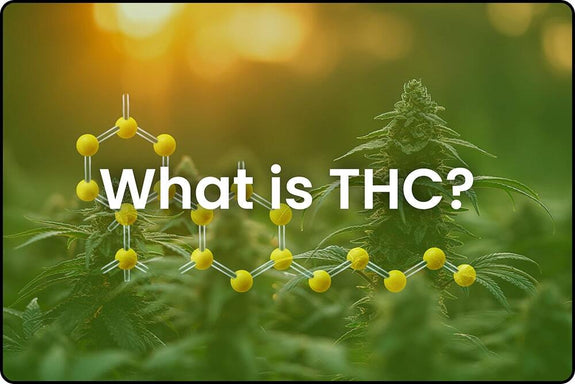
THC, or tetrahydrocannabinol, is the primary psychoactive compound in cannabis responsible for the "high" sensation, interacting with the brain's endocannabinoid system to produce effects like euphoria, relaxation, and altered sensory perception.
THC is one of over 100 cannabinoids identified in cannabis and can be extracted from either hemp or marijuana.
Despite its notoriety for getting you buzzed, THC plays a more complex role, influencing various aspects of health, wellness, and medical treatments.
This article provides a comprehensive exploration of THC, including the distinction between THC from hemp and marijuana, its different types, and its comparison to CBD.
The Chemistry and Mechanism of THC
At a molecular level, THC has a chemical structure similar to that of the endocannabinoid anandamide, which naturally occurs in the human brain.
This similarity allows THC to interact with the body’s endocannabinoid system (ECS), specifically by binding to CB1 receptors predominantly found in the brain and central nervous system.
The interaction between THC and these receptors triggers the release of dopamine, leading to feelings of euphoria, relaxation, and altered sensory perception.
Beyond its psychoactive effects, THC has been studied for its potential therapeutic benefits, such as pain relief, anti-inflammatory properties, and appetite stimulation.
This makes it a compound of interest not only for recreational users but also for medical patients.
THC from Hemp vs. THC from Marijuana
With the newfound ability to buy THC gummies online and other THC products, there is a ton of customer confusion on why some products can be purchased and shipped on the internet, while others need to be purchased in dispensaries.
We're going to simplify things here for you and make it super easy to understand.
To start off, "cannabis" is the genus of the plant. For those of you who forgot your high school biology class lessons, the genus is just a general term for the plant that includes both hemp and marijuana.
Hemp and marijuana are like lemons and limes or alpacas and llamas, they are closely related but have key differences.
While both plants are technically "cannabis" and come from the same family, their legal status and chemical compositions differ significantly.
Hemp-Derived THC:
Hemp is defined by law as cannabis containing no more than 0.3% Delta-9 THC by dry weight.
Hemp plants are primarily grown for industrial uses, such as making textiles, paper, and biofuel, but they are also a source of THC, CBD and minor cannabinoids.
Hemp-derived THC products, particularly Delta-9 gummies, have become popular in markets where marijuana remains illegal.
The reason these products are flooding the internet is because of the 2018 Farm Bill, which was signed in order to help the hemp industry prosper.
The key component of this bill was that hemp is defined as federally legal as long as there is 0.3% or less THC by dry weight.
This sparked the loophole, where brands like us interpreted the passing of the law to mean .3% or less of the finished product, which means you can pack a good amount of THC into products and still have them be legal.
Marijuana-Derived THC:
Marijuana, on the other hand, refers to cannabis plants with a Delta-9 THC concentration above 0.3%.
This plant is cultivated specifically for its psychoactive properties and is the primary source of Delta-9 THC products.
The flower from marijuana-derived THC is more potent and is the primary focus of both recreational and medical cannabis markets, but when extracted from the plant it has the same chemical composition as hemp-derived THC.
The legality of marijuana-derived THC varies widely, with some regions allowing it for medicinal purposes, recreational use, or both, while others maintain strict prohibitions.
But, it still remains federally illegal as a Schedule 1 narcotic and it cannot be purchased online and shipped across state lines.
The Different Types of THC
THC is not a singular entity but rather a group of compounds, each with distinct properties and effects.
This can be also be super confusing, but again, we're going to make it super easy for you to understand.
When someone says "THC", they are usually referring to Delta-9. That being said, THC comes in different types, it's an umbrella term.
So, when you're purchasing THC products they may come in different forms, not just Delta-9.
Below are the most well-known types of THC:
Delta-9 THC:
As discussed, Delta-9 THC is the most common and well-known form of THC.
It is the psychoactive compound primarily found in marijuana, although it can also be extracted from hemp. It's responsible for the classic “high.”
Delta-9 THC is known for its high potency and has been extensively studied for both its recreational and medicinal uses.
In many areas, the legality of cannabis hinges on the concentration of Delta-9 THC.
Delta-8 THC:
Delta-8 THC is a close relative of Delta-9, differing only slightly in its chemical structure.
This difference, however, results in a milder psychoactive effect. Anecdotal evidence estimates that it has about half the firepower of Delta-9.
Delta-8 is often described as offering a more clear-headed, less anxious experience than Delta-9.
It has gained popularity in regions where Delta-9 THC is heavily regulated or illegal, as it is often derived from hemp, making it more accessible.
Delta-10 THC:
Delta-10 THC is another isomer of THC, which has been gaining attention for its subtle effects.
It is less potent than both Delta-8 and Delta-9, offering a super mild, uplifting experience.
Delta-10 is often favored by users looking for a gentle boost in mood and energy without intense psychoactive effects.
Delta-10 is often times used in social settings when you want to feel a slight buzz without being overly inebriated, paranoid or "in-your-own-head."
THC-A (Tetrahydrocannabinolic Acid):
THC-A is the non-psychoactive precursor to Delta-9 THC. In raw cannabis, THC exists primarily as THC-A.
When exposed to heat through smoking, vaping, or cooking, THC-A undergoes a process called decarboxylation, converting it into psychoactive Delta-9 THC.
THC-A is being studied for its potential anti-inflammatory, neuroprotective, and anti-emetic properties.
THC-A is a very advanced way of consuming THC, and is usually only purchased by industry experts looking to experiment with a different kind of "high."
THC-V (Tetrahydrocannabivarin):
THC-V is a less common cannabinoid that has garnered interest for its unique effects.
Unlike other forms of THC which usually cause the "munchies" and can lead to hunger, THC-V is known to act as an appetite suppressant, which has led to research into its potential as a weight-loss aid.
It also has a shorter duration of psychoactive effects, which some users prefer, versus delta-9 which typically lasts 4-6 hours, with the peak effects taking place 2-4 hours after consumption.
THC vs. CBD: The Key Differences
THC and CBD (cannabidiol) are the two most well-known cannabinoids, but they have very different effects and uses.
Understanding these differences is crucial for both consumers and patients.
Overall they both come with supernatural health benefits, but CBD is known as the non-psychoactive 'sister' to THC.
Psychoactivity:
The most significant difference between THC and CBD is psychoactivity. THC is psychoactive, meaning it alters mental state and perception, leading to the "high" associated with cannabis use.
CBD, in contrast, is non-psychoactive. It does not produce a high and is often used for its calming, anti-anxiety, and anti-inflammatory effects without altering consciousness.
That being said, it's important to note that a lot CBD gummies for sale online are made with full-spectrum oil. This means that there are traces of THC in them. While the traces are less than 0.3%, in users who are really sensitive to THC it may cause a slight "high" feeling.
Legal Status:
The legal status of THC and CBD varies. In the U.S., CBD derived from hemp is legal as long as it contains no more than 0.3% Delta-9 THC.
As discussed earlier, the same applies to THC as long as it is hemp-derived.
However, THC from marijuana is still heavily regulated and is only legal in certain regions under specific conditions, such as for medical use or in states where recreational marijuana is allowed.
It's important to check the 3rd party lab results from the brands you are purchasing from or ask them for the "chain of custody" to find out which plant the CBD or THC is sourced from.
Medical Uses:
Both THC and CBD have therapeutic potential, but they are often used for different purposes.
THC is often prescribed for conditions such as chronic pain, nausea, and muscle spasticity.
CBD, on the other hand, is being studied for anxiety and inflammation relief and is often used for epilepsy (notably in the form of the FDA-approved drug Epidiolex).
Some patients find that a combination of THC and CBD, known as the 'entourage effect', provides the most effective relief for their symptoms. This theory suggests that cannabinoids work better synergistically, when used together, versus when they're siloed off and used independently.
Side Effects:
THC is known for its side effects, which can include paranoia, dry mouth, red eyes, increased heart rate, and impaired memory and coordination.
Many THC users can feel like they're "in their own head" or that their minds will spiral off with negative thoughts. Others, feel really chill and relaxed and their worries end up floating away.
These effects are typically dose-dependent and can vary based on individual tolerance.
CBD, while generally well-tolerated, can cause side effects such as dry mouth, diarrhea, and changes in appetite, though these are extremely rare and usually mild.
Importantly, both CBD and THC can interact with other medications, so it's crucial for to consult with your doctor if you're taking any prescriptions.
Interaction with the Endocannabinoid System:
THC and CBD interact with the endocannabinoid system differently. THC binds directly to CB1 receptors in the brain, leading to its psychoactive effects.
CBD does not bind strongly to CB1 receptors; instead, it has a more indirect influence, often acting as an antagonist to THC, which can reduce the psychoactive effects when the two are consumed together.
This makes CBD a popular choice for those seeking the therapeutic benefits of cannabis without the high.
- To further unravel the differences and benefits, check out our comprehensive resource: CBD vs THC
The Potential Benefits and Risks of THC
Therapeutic Benefits:
THC is being used to help reduce stress, elevate mood, decrease discomfort caused from aches and pains and increase appetite.
Many users find that 'healing' with mother nature is a much healthier and sustainable option versus using pharmaceuticals.
THC can also help reduce swelling and nausea, and there are known applications for usage as a sleep aid. It can help induce sleep, especially at higher doses, and keep you slumbered throughout the night.
Mental Health Implications:
While THC can have mood-lifting effects, its impact on mental health is complex and varies from user to user.
For some, especially those who are predisposed to anxiety or with a history of mental health disorders, THC can exacerbate symptoms such as paranoia, anxiety, and even trigger psychosis in extreme cases.
The relationship between THC and mental health is an area of ongoing research, with some studies suggesting that low doses may have therapeutic potential while higher doses pose risks.
Set & Setting is a big topic in the THC community.
Set refers to your mindset, or what your feelings and thoughts are prior to consumption. If something in your life is bothering you, that problem may be amplified after THC usage. The opposite applies as well. If you are extremely happy in life, a THC experience will boost that elation even further.
Setting refers to your environment, surroundings and company while using THC. If you're in a safe and trusted place, the chances of having a 'good trip' are much higher than if you're in a place where you feel uncomfortable or in danger.
Cognitive Effects:
THC is known to impair short-term memory, attention, and motor coordination, particularly in high doses.
As portrayed in many stoner movies like Half Baked or The Big Lebowski, you may feel a bit slow and unable to process words.
It's important to not operate any motor vehicles or heavy machinery during consumption.
These cognitive effects are usually temporary, wearing off as the THC leaves the system, but they can be more pronounced in frequent users.
Long-term use of THC, especially when started in adolescence, has been associated with a potential risk of cognitive decline, though this is still a matter of scientific debate.
Addiction and Dependence:
THC can definitely be habit-forming, leading to what is known as cannabis use disorder.
While it is generally considered less addictive than substances like nicotine or opioids, some users may develop a psychological dependence, characterized by cravings and continued use despite negative consequences.
Withdrawal symptoms can occur in heavy users, including irritability, insomnia, and changes in appetite, but these are typically mild compared to other substances.
THC has also been widely discussed as a 'gateway drug', leading users to try other substances, like hard drugs such as: cocaine, ecstasy and heroin. That being said, there is a counter-culture argument that this is completely false and an accusation that it's actually propaganda from the big alcohol and tobacco companies.
Many users just use THC and don't 'graduate' to other hard drugs, and it usually stems from the original intent of using THC products in the first place.
The Future of THC: Research and Legal Trends
The legal landscape surrounding THC is rapidly evolving, with more regions adopting measures to legalize or decriminalize cannabis.
There is actually a proposed bill to shift marijuana from Schedule I to Schedule III in the Controlled Substances Act. This bill is called the Marijuana Opportunity Reinvestment and Expungement (MORE) Act.
The goal here is to decriminalize marijuana at the federal level and also free those who have been incarcerated for small amounts of marijuana. Communities of color are often the ones that are most negatively affected by this, so it specifically addresses that social issue at hand.
Research on THC is growing, particularly as legal restrictions on cannabis research ease and labs and campuses can start studying the plant without threat of prosecution.
Scientists are exploring THC's potential in treating a wider range of conditions, including neurodegenerative diseases, autoimmune disorders, and mental health conditions. While there are not enough studies to make any substantiated claims regarding the efficacy, we're hopeful that research will surface in the near future showing positive results.
Conclusion
THC is a multifaceted compound that continues to be at the center of both scientific research and public debate.
From its psychoactive properties that define recreational cannabis use to its therapeutic potential in treating a range of medical conditions, THC's influence is profound.
Understanding the different types of THC, the distinctions between hemp-derived and marijuana-derived THC, and the comparison with CBD is essential for anyone interested in cannabis.
As research advances and legal frameworks evolve, THC will likely play an increasingly significant role in both medicine and society.
RECOMMENDED BASED ON ARTICLE
-
Best SellerMedium Dose
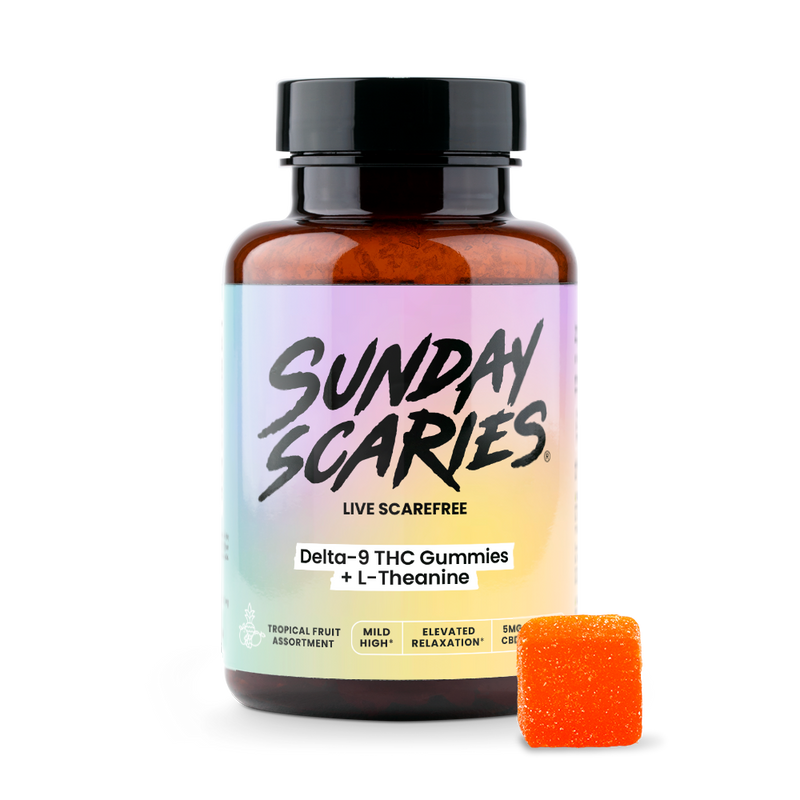
5mg Delta-9 Gummies
4.7Rated 4.7 out of 5 stars490 Reviews

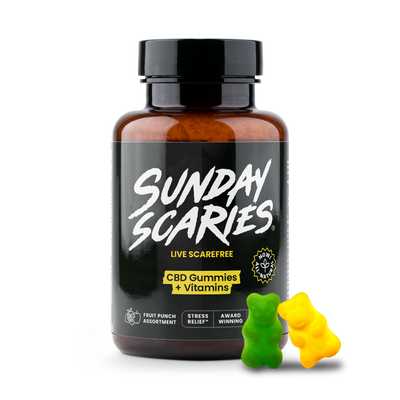 CBD Gummies
Stress Relief
CBD Gummies
Stress Relief
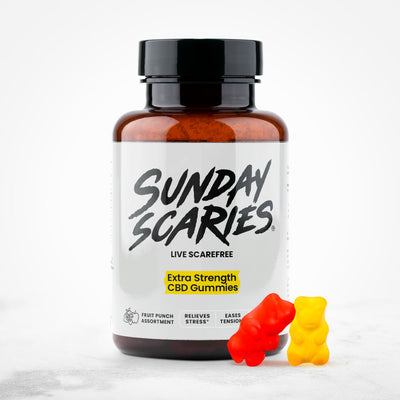 Extra Strength CBD Gummies
Stress Relief
Extra Strength CBD Gummies
Stress Relief
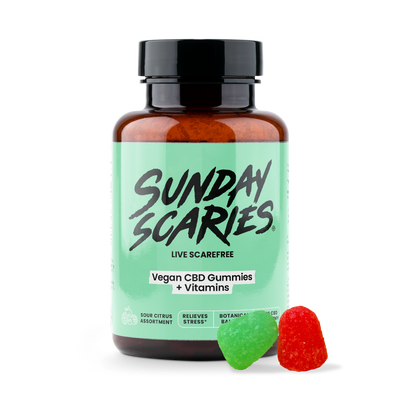 Vegan CBD Gummies
Stress Relief
Vegan CBD Gummies
Stress Relief
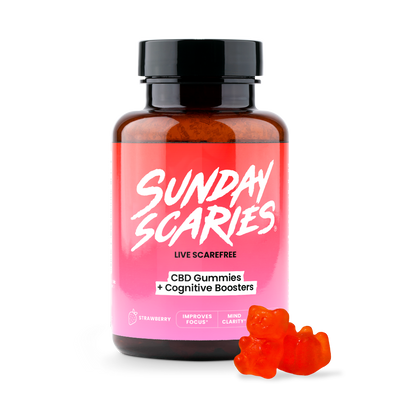 CBD Gummies for Focus
Focus Boost
CBD Gummies for Focus
Focus Boost
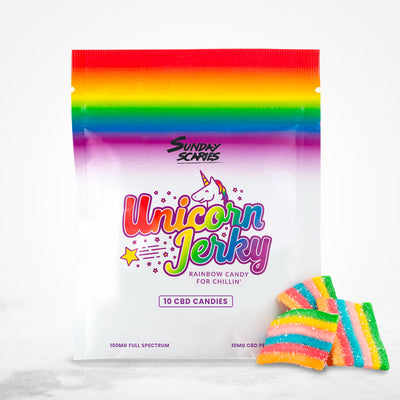 CBD Candy
Mood Lift
CBD Candy
Mood Lift
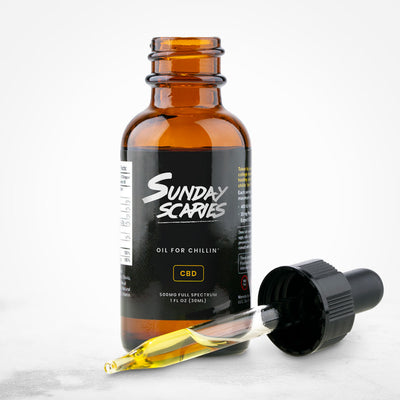 CBD Daytime Oil
Stress Relief
CBD Daytime Oil
Stress Relief
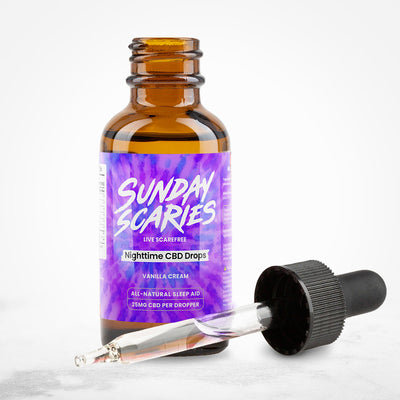 CBD Sleep Oil
Sleep Aid
CBD Sleep Oil
Sleep Aid
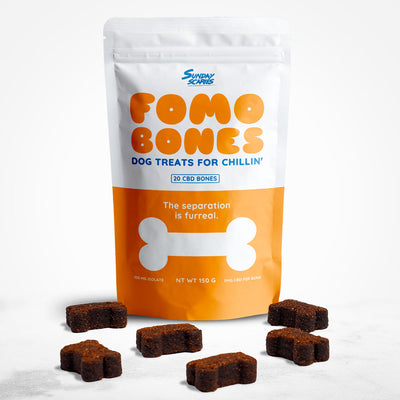 CBD Dog Treats
Stress Relief
CBD Dog Treats
Stress Relief
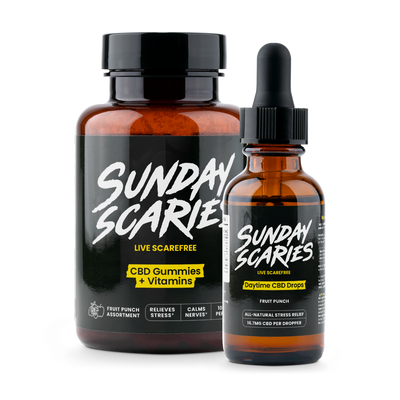 Side Piece Bundle
Stress Relief
Side Piece Bundle
Stress Relief
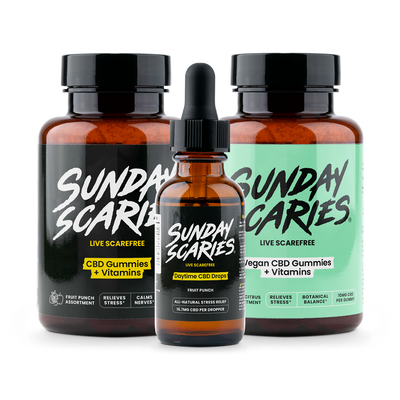 Rando Bundle
Stress Relief
Rando Bundle
Stress Relief
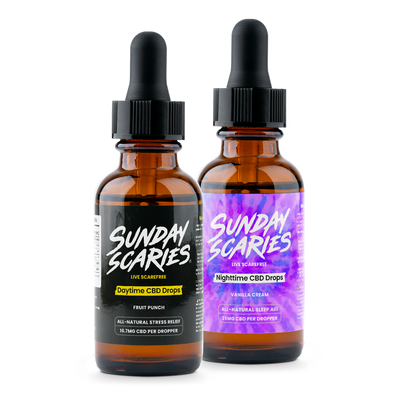 Sunrise & Sunset CBD Oil Bundle
Stress Relief
Sunrise & Sunset CBD Oil Bundle
Stress Relief
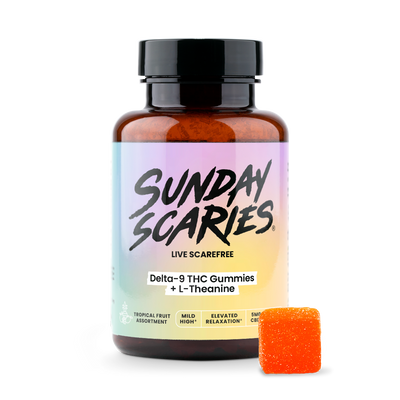 5mg Delta-9 Gummies
Euphoria
5mg Delta-9 Gummies
Euphoria
 10mg Delta-9 Gummies
Euphoria
10mg Delta-9 Gummies
Euphoria
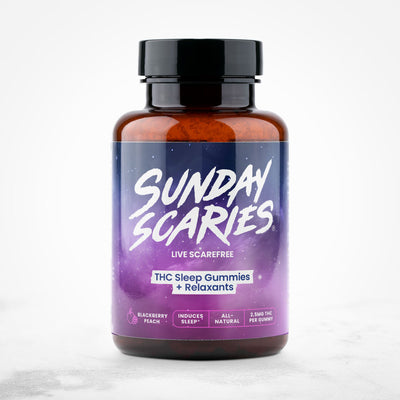 THC Gummies for Sleep
Sleep Aid
THC Gummies for Sleep
Sleep Aid
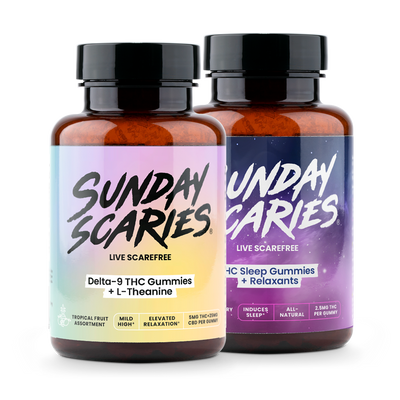 Day & Night THC Gummies Bundle
Stress Relief
Day & Night THC Gummies Bundle
Stress Relief
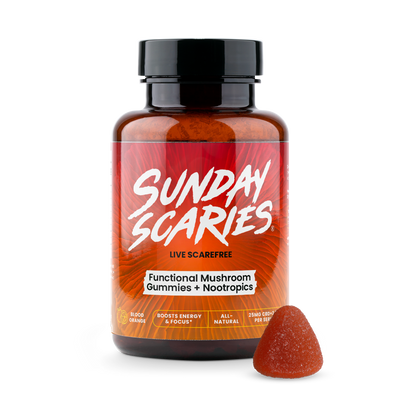 Mushroom Gummies
Focus Boost
Mushroom Gummies
Focus Boost
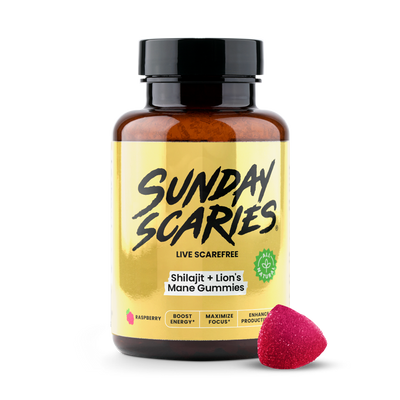 Shilajit Gummies
Focus Boost
Shilajit Gummies
Focus Boost
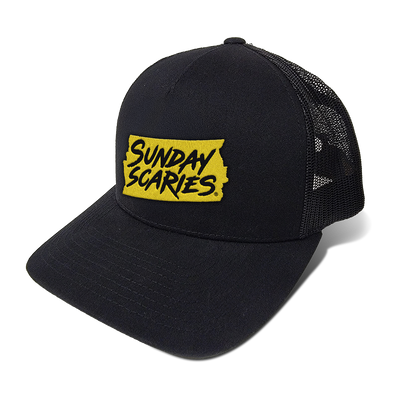 Sunday Scaries Hat
Sunday Scaries Hat
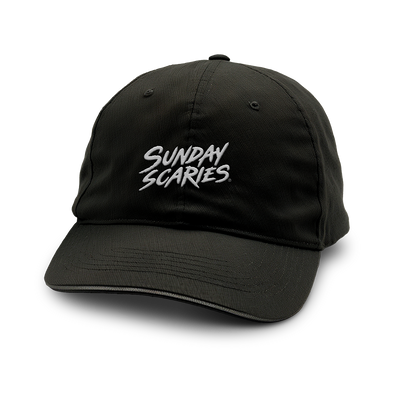 Sunday Scaries Dad Hat
Sunday Scaries Dad Hat
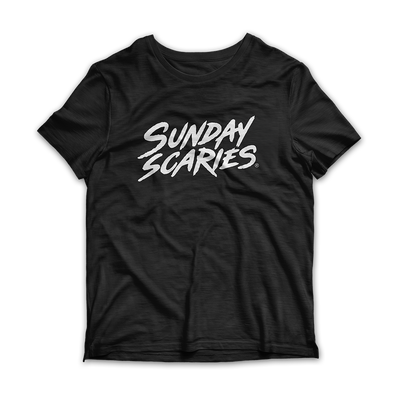 Sunday Scaries T-Shirt
Sunday Scaries T-Shirt
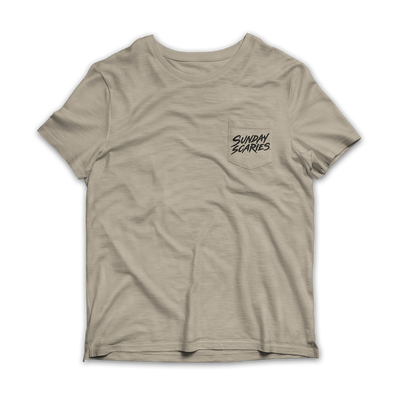 Sunday Scaries Pocket Tee
Sunday Scaries Pocket Tee
 Sunday Scaries Tank Top
Sunday Scaries Tank Top
 Sunday Scaries Sweatshirt
Sunday Scaries Sweatshirt
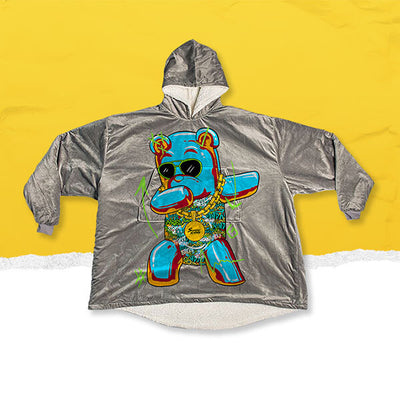 Sunday Scaries Blanket Jacket
Sunday Scaries Blanket Jacket
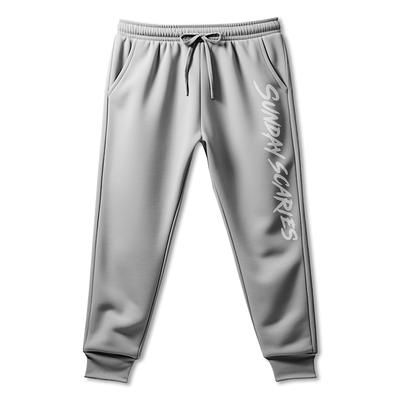 Sunday Scaries Sweatpants
Sunday Scaries Sweatpants
